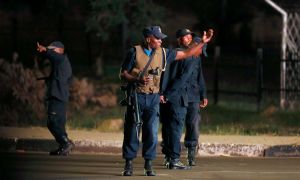Poland's President Andrzej Duda is undergoing significant transformations within his administration, highlighted by the recent changes to his National Security Bureau and the Presidential Chancellery. These shifts, which officials confirm were already underway, have raised questions about the dynamics of power between key figures within Duda's team.
The most notable change is the appointment of General Dariusz Łukowski as the new head of the National Security Bureau (BBN), succeeding Jacek Siewiera, who resigned to pursue academic endeavors at the University of Oxford. His resignation was confirmed by Małgorzata Paprocka, head of the Presidential Chancellery, who framed it as part of Siewiera's personal and professional plans.
“The minister decided to take up a scholarship at Oxford,” Paprocka informed reporters, emphasizing the planned transition was agreed upon with President Duda. This change marks not only the loss of one of the president's closest advisors but also signals Duda's intentions to refresh his administration as pressures intensify on multiple fronts.
On the same day, Duda announced the appointment of Wojciech Kolarski as the new head of the International Policy Bureau, replacing Mieszko Pawlak. Pawlak has reportedly faced disapproval from Duda and has been reassigned as Deputy head of the BBN. Kolarski, previously involved closely with the president, is perceived to be more aligned with Duda's goals, consolidations likely aimed at ensuring tighter control over foreign policy engagements.
The reshuffle has also included the promotion of Nikodem Rachoń, brother of Michał Rachoń, from the state-controlled media outlet Telewizja Republika. He is now appointed as Deputy to Kolarski, raising eyebrows about the political significance of this move. Speculations suggest this decision might be Duda's strategy to strengthen relationships with media factions supportive of his administration.
“It’s undoubtedly a bow to Telewizja Republika and its environment,” stated an anonymous source close to the presidential office, hinting at the political dynamics at play. The move fosters perceptions of Duda’s attempt to maintain close ties with media outlets which can bolster his narrative as he navigates through turbulent political waters.
These changes come as Duda prepares for increased scrutiny as he gears up for the upcoming Three Seas Initiative summit and balances Poland's foreign relations, particularly with the United States under President Donald Trump. The political ramifications of these appointments are extensive, as they reflect Duda's diminishing tolerance for dissent within his ranks, particularly from officials like Marcin Mastalerek, currently encumbered by intraparty conflicts and criticism over his failure to secure key global meetings.
Mastalerek has lost significant leverage with the establishment of new roles and shifted responsibilities, particularly concerning the oversight of press operations now transferred to newly appointed spokesperson Diana Głownia. With her characteristically sharp background from the Ministry of Foreign Affairs, Głownia's promotion is viewed as part of Duda’s broader strategy to realign the presidential communications to be more effective and cohesive.
Duda himself addressed the significance of these reshuffles, acknowledging the seriousness of the political climate. “The tasks I am assigning are exceedingly significant and challenging” he stated, hinting at the necessity for his administration to respond swiftly to both internal and external pressures. This reshuffle, seen as one of the most substantial during his presidency, signifies not just the adjustments surrounding key personnel but potentially foreshadows changes to Poland’s foreign policy direction.
The president also alluded to the increasing complexity of security matters, particularly emphasizing the need for astute engagement with international partners and their prospects of cooperation. “We must be clear; our voice must be heard, and our policies must resonate,” he stressed, underlining the importance of continually adapting state strategy to the ever-shifting geopolitical terrain.
This administration revamp reflects more than just personnel changes. It serves as Duda's attempt to consolidate power, mitigate dissent, and establish stronger relations with media and strategic partners. With the increasing urgency of upcoming international negotiations and looming political challenges, Duda's motivated push for these alterations may pave the way for either solidification or destabilization of his political agency moving forward.



